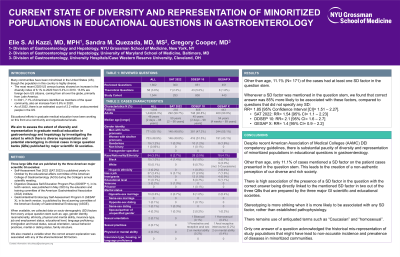Tuesday Poster Session
Category: Practice Management
P4056 - Paucity of Diversity and Representation of Minoratized Individuals in Educational Questions in Gastroenterology
Tuesday, October 24, 2023
10:30 AM - 4:00 PM PT
Location: Exhibit Hall

Has Audio
.jpg)
Elie Al Kazzi, MD, MPH
University Hospitals-Case Western Reserve University
New York, NY
Presenting Author(s)
Elie Al Kazzi, MD, MPH1, Sandra Quezada, MD, MS2, Gregory Cooper, MD3
1University Hospitals-Case Western Reserve University, Cleveland, OH; 2University of Maryland School of Medicine, Baltimore, MD; 3Case Western Reserve/UHCMC, Cleveland, OH
Introduction: In the wake of racial reckoning in the USA and heightened awareness of health disparities that minoritized individuals face on a daily basis, the AAMC guidelines advocate for integrating diversity, equity, and inclusion (DEI) competencies throughout the medical education continuum. We aimed to assess the extent of representation in graduate medical education in gastroenterology/ hepatology by investigating the extent to which there is diverse representation in clinical cases in 3 large question banks published by major scientific GI societies.
Methods: We reviewed the DDSEP+ question bank from AGA, the 2022 self-assessment test from ACG and GESAPX from ASGE offered for ABIM GI certification exam preparation. We only included questions pertaining to clinical cases in our analysis. We collected data on age, and socio-demographics (SD) such as gender identity, race, nationality physical and mental ability, job status, educational level, immigration status, sexual orientation, and marital or dating status (Table 1).
Results: We reviewed a total of 1,602 questions. Once we excluded theoretical review questions, our study cohort included a final number of 1,544 clinical questions. 1,440 (93.3%) were adult patients. Median age was 48 years and ranged from 2 days to 98 years. 48.9% (n=753) were identified as women with she/her pronouns. 19 (1.2%) patients did not carry any gender identity. In total, 11.1% (N=171) cases included a description of any SD factors. In these instances, the correct answer was 85% more likely to be associated with these factors, whenever mentioned in the question stem, compared to questions that did not specify any SD (RR: 1.85 [95% CI= 1.51 – 2.27]).
Discussion: Despite AAMC DEI competency guidelines, GI board review questions continue to lack diverse patient representation. Failing to include diverse SD in clinical cases creates a non-authentic perception of our society. Addressing representation within medical educational cases will more fully portray the diversity of the patients we treat, and better prepare future providers to treat diverse patient populations. Stereotyping becomes more striking when the correct answer is usually associated with any of the rare instances a SD factor is mentioned in the stem of the question. In an effort to provide equitable care, we call on the major GI societies to ensure that their educational resources include DEI related competency-driven content in their board examination review questions and clinical scenarios.
Disclosures:
Elie Al Kazzi, MD, MPH1, Sandra Quezada, MD, MS2, Gregory Cooper, MD3. P4056 - Paucity of Diversity and Representation of Minoratized Individuals in Educational Questions in Gastroenterology, ACG 2023 Annual Scientific Meeting Abstracts. Vancouver, BC, Canada: American College of Gastroenterology.
1University Hospitals-Case Western Reserve University, Cleveland, OH; 2University of Maryland School of Medicine, Baltimore, MD; 3Case Western Reserve/UHCMC, Cleveland, OH
Introduction: In the wake of racial reckoning in the USA and heightened awareness of health disparities that minoritized individuals face on a daily basis, the AAMC guidelines advocate for integrating diversity, equity, and inclusion (DEI) competencies throughout the medical education continuum. We aimed to assess the extent of representation in graduate medical education in gastroenterology/ hepatology by investigating the extent to which there is diverse representation in clinical cases in 3 large question banks published by major scientific GI societies.
Methods: We reviewed the DDSEP+ question bank from AGA, the 2022 self-assessment test from ACG and GESAPX from ASGE offered for ABIM GI certification exam preparation. We only included questions pertaining to clinical cases in our analysis. We collected data on age, and socio-demographics (SD) such as gender identity, race, nationality physical and mental ability, job status, educational level, immigration status, sexual orientation, and marital or dating status (Table 1).
Results: We reviewed a total of 1,602 questions. Once we excluded theoretical review questions, our study cohort included a final number of 1,544 clinical questions. 1,440 (93.3%) were adult patients. Median age was 48 years and ranged from 2 days to 98 years. 48.9% (n=753) were identified as women with she/her pronouns. 19 (1.2%) patients did not carry any gender identity. In total, 11.1% (N=171) cases included a description of any SD factors. In these instances, the correct answer was 85% more likely to be associated with these factors, whenever mentioned in the question stem, compared to questions that did not specify any SD (RR: 1.85 [95% CI= 1.51 – 2.27]).
Discussion: Despite AAMC DEI competency guidelines, GI board review questions continue to lack diverse patient representation. Failing to include diverse SD in clinical cases creates a non-authentic perception of our society. Addressing representation within medical educational cases will more fully portray the diversity of the patients we treat, and better prepare future providers to treat diverse patient populations. Stereotyping becomes more striking when the correct answer is usually associated with any of the rare instances a SD factor is mentioned in the stem of the question. In an effort to provide equitable care, we call on the major GI societies to ensure that their educational resources include DEI related competency-driven content in their board examination review questions and clinical scenarios.
Disclosures:
Elie Al Kazzi indicated no relevant financial relationships.
Sandra Quezada indicated no relevant financial relationships.
Gregory Cooper indicated no relevant financial relationships.
Elie Al Kazzi, MD, MPH1, Sandra Quezada, MD, MS2, Gregory Cooper, MD3. P4056 - Paucity of Diversity and Representation of Minoratized Individuals in Educational Questions in Gastroenterology, ACG 2023 Annual Scientific Meeting Abstracts. Vancouver, BC, Canada: American College of Gastroenterology.
